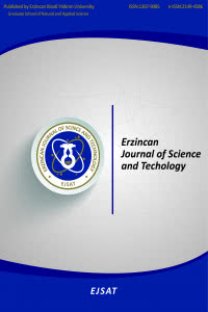FEN VE TEKNOLOJİ ÖĞRETMEN ADAYLARININ BİLGİSAYAR KULLANIMINA İLİŞKİN TUTUMLARININ FARKLI DEĞİŞKENLER AÇISINDAN İNCELENMESİ
Bu çalışma, fen ve teknoloji öğretmen adaylarının bilgisayar kullanımına ilişkin tutumlarının farklı değişkenler açısından incelenmesi amacıyla yapılmıştır. Araştırmada betimsel desenlerden tarama yöntemi kullanılmıştır. Araştırmaya 2011-2012 öğretim yılında bir devlet üniversitesinin Eğitim Fakültesi Fen Bilgisi Öğretmenliği Anabilim Dalı’nın 1., 2., 3. ve 4. sınıflarında öğrenim gören toplam 420 öğretmen adayı katılmıştır. Araştırmanın verileri araştırmacılar tarafından geliştirilen anket formu ve bir bilgisayar tutum ölçeği kullanılarak elde edilmiştir. Araştırmanın verileri aritmetik ortalama, t-testi ve tek faktörlü ANOVA testleri ile analiz edilmiştir. Araştırmanın sonucunda cinsiyetin, bilgisayara sahip olma durumunun, bilgisayar kullanmaya başlama yıllarının, bilgisayar kullanma sıklığının ve bilgisayar kullanma amaçlarının bilgisayar kullanımına yönelik tutum puanlarını anlamlı düzeyde etkilediği görülmüştür.
Anahtar Kelimeler:
Fen ve Teknoloji Öğretmen Adayı, Bilgisayar Kullanımı, Bilgisayar Tutumu
___
- Abbott, J.A., & Faris, S.E. (2000). Integrating technology into preservice literacy insruction: A survey of elementary education students’ attitudes toward computers. Journal of Research on Computing in Education, 33, 149-161. Aizen, I. (2005). Attitudes, Personality and Behaviour. [http://site.ebrary.com/lib/Giresun /Doc?id=10161279 &ppg=16] adresinden 06.01.2012 tarihinde edinilmiştir.
- Ates, A., Altunay, U., & Altun, E. (2006). Bilgisayar destekli İngilizce öğretiminin lise hazırlık öğrencilerinin İngilizce’ye ve bilgisayara yönelik tutumları üzerindeki etkileri. Eğitimde Kuram 2, 97-112. ve Uygulama,
- Bakr, S.M. (2011). Attitudes of Egyptian Teachers towards Computers. Contemporary Educational Technology, 2(4), 308-318 .
- Bindak. R. & Çelik. H.Ç. (2006). Öğretmenler için tutum ölçeğinin güvenirlik ve geçerlik çalışması. Eğitim Araştırmaları. 22. 38-47.
- Bovee, C., Voogt, J., & Meelissen, M. (2007). Computer attitudes of primary and secondary students in South Africa. Computers in Human Behavior, 23, 1762-1776.
- Collis, B. (1985). Sex differences in secondary school students’ attitudes toward computers. The Computing Teacher, 12, 33-36.
- Çelik, H.C. & Bindak, R. (2005). İlköğretim okullarında görev yapan öğretmenlerin bilgisayara yönelik tutumlarının çeşitli değişkenlere göre incelenmesi. İnönü Üniversitesi Eğitim Fakültesi Dergisi. 6 (10), 27- 38.
- Çepni. S. (2007). Araştırma ve Proje Çalışmalarına Giriş. Trabzon: Celepler Matbaacılık. Geliştirilmiş 3. Baskı.
- El-Gayar, O., Moran, M., & Hawkes, M. (2011). Students' acceptance of tablet PCs and implications for Technology & Society, 14 (2), 58–70.
- educational institutions. Educational
- Fritz, R. (2008). Power of a Positive Attitude : Discovering the Key to Success. 7181&ppg=8] adresinden 06.01.2012 tarihinde edinilmiştir. giresun/Doc?id=102
- Johnson, R.P. (1985). School computing: Some factors affecting student performance. Paper presented at the American Educational Research Association. (ERIC Document Reproduction Service No. ED 258 554).
- annual meeting of the
- Kaptan, F. (1999). Fen Bilgisi Öğretimi. İstanbul: Milli Eğitim Bakanlığı Yayınları.
- Krendl, K.A., Broihier, M.C. & Fleetwood, C. (1989). Children and computers: Do sex-related differences persist? Journal of Communucation, 39, 85-93.
- Kutluca, T., & Ekici, G.(2010). Öğretmen adaylarının bilgisayar destekli eğitime ilişkin tutum ve öz-yeterlilik algılarının incelenmesi. Hacettepe Üniversitesi Eğitim Fakültesi Dergisi, 38,177-188.
- Lenard, M.J., Wessels, S. & Khanlarian, C. (2010). Gender differences ın attitudes toward computers and performance in the accounting information systems class. American Journal of Business Education. 3(2), 23-29.
- Miura, I.T. (1986). Understanding gender differences in middle school computer interest and use. Paper American Educational Research Association. (ERIC Document Reproduction Service No. ED 273 2481).
- Romi, S., & Zobi, H. (2003). The ınfluence of computer technology learning program on attitudes toward computers and self-esteem among dropout youth. Eucational Media International, 40, 259-268.
- Smith, S.D. (2001). Relationships of computer attitudes to sex, grade-level, and teacher influence. Education, 106 (3), 338-344.
- Subhi, T. (1999). Attitudes toward computers of gifted and their teachers. High Ability Studies, 10, 69-84.
- Teo, T. (2008). Pre-service teachers’ attitudes towards computer use: A Singapore survey, Australasian Journal of Educational Technology, 24 (4), 413-424.
- Teo, T. & Lee, C.B. (2008). Attitudes towards computers among students in higher education: A case study in Singapore. British Journal of Educational Technology.39 (1), 160-162.
- Teo, T. (2006). Attitudes toward computers: a study of post-secondary students in singapore. Interactive Learning Environments. 14 (1), 17 – 24.
- Wekesa, D. W., Wekesa, E.W., Mualuko, N.J. & Julius, M. (2008). Students’ reactions to the use of computers in science education in selected Kenyan secondary schools. Problems of Educatıon in the 21st century. 9, 107-114.
- Wilder, G., Mackie, D., & Cooper, J. (1985). Gender and computers: Two surveys of computer related attitudes: An analysis by gender. Sex Roles, 13(3-4), 215–228.
- Yalın, H. İ. (2010). Öğretim Teknolojileri ve Materyal Geliştirme. Ankara: Nobel Yayınları.
- Yenice, N. (2003). Bilgisayar destekli fen bilgisi ögretiminin ögrencilerin fen ve bilgisayar tutumlarına etkisi. The Turkish Online Journal of Educational Technology, 2, Article 12.
- Yıldırım, K., Bozdoğan , A.E. & Taşdemir, A. (2007). Öğretmen adaylarının bilgisayar kullanımına ilişkin tutumlarının karsılaştırılması. VIII.Uluslar arası Öğretim Teknolojileri Kongresi. Özetler Kitabı, Yakın Doğu Üniversitesi, KKTC, p:357-362.
- Yılmaz, N. & Alıcı, Ş. (2011). Investigating pre-service early chıldhood teachers’ attitudes towards the computer based education in science activities. The Turkish Online Journal of Educational Technology.10 (3), 161-167. ****
- ISSN: 1307-9085
- Yayın Aralığı: Yılda 3 Sayı
- Başlangıç: 2008
- Yayıncı: Erzincan Binali Yıldırım Üniversitesi, Fen Bilimleri Enstitüsü
Sayıdaki Diğer Makaleler
Aykut BOZDOĞAN, Mustafa UZOĞLU
ÇEKMEYE MARUZ ARA BOŞLUKLU ÇİFT TAKVİYELİ YAPIŞTIRMA BAĞLANTILARINDA GERİLME ANALİZİ
Şemsettin TEMİZ, Adnan ÖZEL, Şerif ÇİTİL
SÜBSTİTÜE POLİANİLİNLERİN VE ANİLİN İLE KOPOLİMERLERİNİN SENTEZİ VE KARAKTERİZASYONU
Sabriye ÖZKORUCUKLU, Mustafa CENGİZ
YAPIŞTIRICIYLA BİRLEŞTİRİLMİŞ T-BAĞLANTI TİPİNİN İKİ VE ÜÇ BOYUTLU GERİLME ANALİZİ
FEN EĞİTİMİ ALAN ÖĞRENCİLERİN s, p ve d ORBİTALLERİNİ ANLAMA DÜZEYLERİ
Kemal DOYMUŞ, Yasemin KOÇ, Adem AKKUŞ, Fulya BAŞARAN, Yusuf ZORLU
ÇİFT TAKVİYELİ YAMALARI GÖMÜLÜ YAPIŞTIRMA BAĞLANTILARININ EĞİLME ALTINDA ANALİZİ
BİRLİKTELİK KURALLARI İLE MEKÂNSAL-ZAMANSAL VERİ MADENCİLİĞİ
Muhammed ALAEDDİNOĞLU, Tolga AYDIN, Deniz DAL
